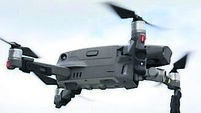Poetry review: Bold poems full of verve and ambiguity

One of Patrick Cotter’s unique skills is his ability to summon animal figures to engage with a range of complex subjects. Picture: David Creedon
- Quality Control at the Miracle Factory
- Patrick Cotter
- Dedalus, €12.50 pb/ €20.00 hb
BOOKS & MORE
Check out our Books Hub where you will find the latest news, reviews, features, opinions and analysis on all things books from the Irish Examiner's team of specialist writers, columnists and contributors.







